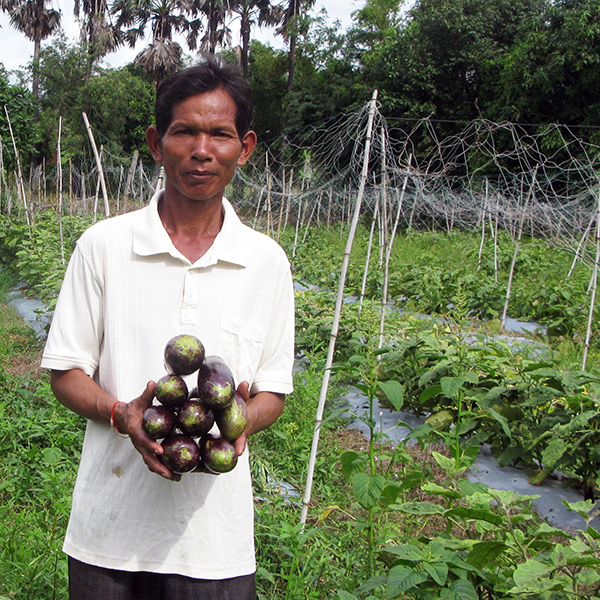Stories of Change

Bunthoeun holds some of the eggplants that he and Sarem grew.
There’s no place like home
Prom Bunthoeun and his wife, Yorn Sarem, raised their children in a village called Nikom Kandal. It’s in Cambodia’s Battambang province, near the border with Thailand.
Years ago, Bunthoeun and Sarem grew vegetables on land they owned. But they never managed to make ends meet as farmers. They made the difficult decision to leave their three children at home with their grandparents and try to find work in Thailand. There, they could earn $15 a day laboring on construction projects. That may seem like plenty of money, but they had to spend most of it paying for food and rent in Thailand. There wasn’t much left over to send home to Nikom Kandal.
Last year, Bunthoeun came back to visit his family. That’s when it became clear to neighbors that his family was really struggling. Among those who took notice was our partner Rural Development Association. Bunthoeun and his family were invited to join the CWS-supported Promoting Better Lives program to help improve their situation. Sarem came home, and we got to work.
Like all program participants, Bunthoeun and Sarem began with studying the basics of vegetable gardening best practices. They already had an advantage over many families because they already owned land–even though they stopped using it years ago. So step one was to reclaim their 1/5 acre (about 8,700 square feet) parcel. Then they started creating a sustainable government with supplies and guidance from CWS and RDA. The couple decided to grow eggplant because they knew that there was a demand for it locally and they would be able to sell it. By using what they had learned about soil preparation, natural fertilizers, pest control and water conservation, Bunthoeun and Sarem created a flourishing and profitable garden.
During the three-month planting, tending and harvest cycle, the couple earned about $12.50 a day. With this much income, they had enough money to buy rice and nutritious foods. They are no longer facing food shortages like their children and parents did when they only had the small remittances from Thailand to live on.
But it isn’t just the food that they’ve been able to purchase. They had money left over to expand the garden to also grow cucumbers, another valuable crop. They teamed up with their eldest son, a 23-year-old electrician living in Phnom Penh, to send their middle child to university. Their youngest, a 17-year-old, is continuing high school. The family’s quick progress towards a life of dignified work and a bit of prosperity is an inspiration for our team, and reaffirms our believe that there is enough for all.
